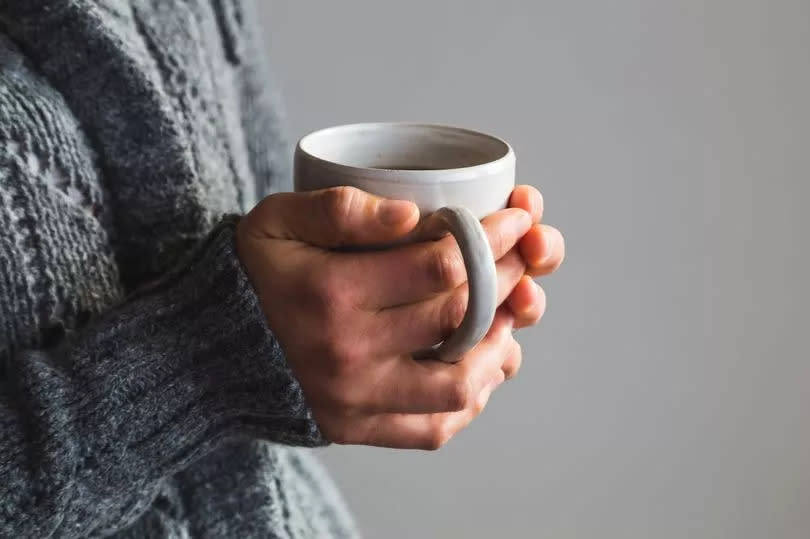Expert says what time of day you should stop drinking tea

A sleep expert has issued a warning to Brits that their love of tea is ruining their night's rest. The UK consumes 100 million cups of tea daily.
In an online poll, two in five respondents admitted they drink as many as five to ten cups of tea per day. The humble cup of English breakfast tea is one of our many comforts, but there’s a surprising twist: your tea obsession is hindering your chances of a sound slumber.
In light of National Tea Day on April 21, sleep experts at MattressNextDay, which carried out the poll, have unveiled the complexities of the UK’s favourite hot drink in their latest research, including when you should stop drinking tea to prevent it from disturbing your sleep.
Sleep expert reveals why you should never drink tea past 3pm
Sleep expert Martin Seeley at MattressNextDay has warned against drinking cups of tea before bed, despite the belief that the comfort drink encourages sleep.
He said: “Cups of tea are consumed by many, as is tradition in the UK, whether they’re made in vast quantities on the tea round in the office or offered to others as a gesture of goodwill and kindness for a pick me up. Tea contains amino acid L-theanine, which promotes relaxation - however, studies suggest that drinking drinks with caffeine in the six-hour period before bedtime can lead to a disturbed sleep.
"Even stopping your tea intake a few hours before bedtime is not enough to mitigate the sleep-preventing effects of the caffeine contained. Avoid drinking tea from around 2pm to ensure sleep isn’t affected.”
Favourite tea brand is also the one most likely to keep you awake at night
Plenty of us love a cuppa before heading to bed. However, MattressNextDay delved into the shadows of the tea aisle, exposing the worst offenders for high caffeine content and therefore sabotaging a peaceful sleep.
Fan-favourite tea brand PG Tips is the worst culprit for keeping you up at night, according to MattressNextDay. The caffeine content in one mug of PG Tips with a dash of milk is the same as that in a teaspoon of instant coffee brand Nescafe.
Caffeine content was taken from each brand’s respective nutritional information on brand website. For herbal tea brands, caffeine content was recorded from their English Breakfast Tea product
Craving a cuppa after 3pm? Here’s what to drink instead
However, all hope is not lost - Martin at MattressNextDay appreciates the UK’s love of all things comforting and so have provided key alternatives for drinking in the lead up to bedtime.
1. Lavender tea - The best tea for making you sleepy
Made by brewing the buds of the lavender plant in hot water, lavender tea is a caffeine-free, sleep-inducing warm nighttime beverage.
Studies have shown that especially for older adults, lavender tea can effectively reduce symptoms of anxiety and depression, which directly relate to insomnia. By stimulating brain activity and influencing impulse transmissions between brain cells, lavender has been found to produce a calming effect on your nervous system.
2. Chamomile tea - Best tea for reducing pain and inflammation
With an aromatic earth-floral flavour, chamomile tea is well-known for its calming effects. With medicinal relaxing properties, chamomile tea reduces feelings of stress and anxiety.
Within the tea, a flavonoid (natural substance) called apigenin creates a mild sedative effect, by binding to receptors in the brain. These receptors are responsible for making you feel sleepy and reducing anxiety, so chamomile tea enhances this process.
Chamomile also has anti-inflammatory properties, helping to minimise the pain felt from arthritis, stomach cramps or other painful conditions that might be keeping you up at night.
3. Valerian tea - To help you relax
GABA (gamma aminobutyric acid) is a chemical in the brain that regulates your nerve cells and promotes feelings of calmness. Valerian is thought to increase the levels of GABA in your brain, reducing anxiety and helping you relax before bed.
Made from the root of the valerian plant, this tea can have an unpleasant smell, so is often mixed with other teas such as lavender or chamomile. However, valerian includes sleep-inducing antioxidants, so can be used before bedtime to help you unwind.
MattressNextDay's online poll asked respondents what some of the tea-drinking habits they do daily. It said 21 stated they drank tea late at night or right before bed, 34 drank tea as soon as they woke up, 47 stated they drank more than five cups per day.

 Yahoo News
Yahoo News 
